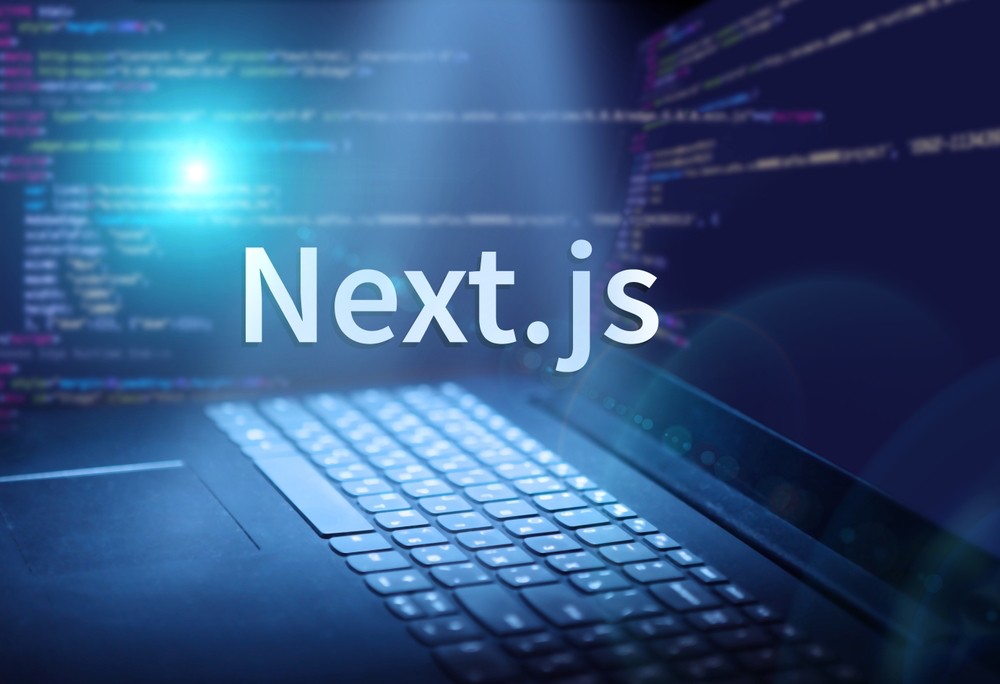Next.js is a well-known platform most of you utilize to build a responsive website. However, if you are annoyed by its limited features, consider Next.js alternatives because flexibility and faster loading speed are always the top concerns of every developer. For this reason, you might need to read this article to explore the top 10 Nextjs Alternatives for the exciting world of web development frameworks.
What is Next.js?
To create blazingly fast websites, you can use Next.js and build an SEO-friendly website using JavaScript. This framework will help you create fast-load web pages to deliver a smooth user experience. Moreover, it provides React Server Components with reusable codes to control the parts of the user interface. Mainly, React is a JavaScript library that you can utilize to increase the functionality of your website.
Next.js also provides you with CSS support to enhance the style of your application with more advanced tools, including CSS modules and Tailwind CSS. However, most developers are concerned with the low rendering speed while building a code. For this purpose, Next.js provides a flexible rendering and caching option to efficiently convert your code into a user interface.
You may also like: Next.js vs React: What are the Differences?
What are the Limitations of Next.js?
Next.js is a well-known framework that was launched on October 25, 2016, for building web pages and applications. However, like other frameworks, it has limitations that you should be aware of while using it. This section will discuss some Next.js barriers you might face while developing a website.
- Configuration Complexity: Accessing Next.js is notably straightforward because it has good starting options. However, you might struggle with additional setup and configuration when designing complex features for more advanced stuff.
- Learning Curve: Next.js simplifies building websites, but as a beginner, you may face learning curves when you need to understand React and JavaScript. For this reason, you might look for alternatives to Next.js for better learning outcomes.
- Size of Starting Bundle Size: When making a web application or website, the initial bundle size is larger than other Next.js alternatives. Therefore, it may take longer to load the backend files, especially if you have a slow internet connection.
- Limited SSR Caching and Rendering: This web development framework provides some built-in caching mechanisms for SSR, but it might not always work perfectly for every situation. Besides, it might impact the performance of complex applications.
Why Do You Need to Choose Alternatives to Next.js?
Undoubtedly, Next.js is a great web development framework for building responsive websites, but you must look for Next.js alternatives in various scenarios. Hence, this part will explain some common reasons for an urge to explore alternatives.
- Community Support: Having community support is an edge when working on complex projects, but Next.js doesn’t offer an active community for guidelines. Therefore, you should explore alternatives to Next.js that provide more resources and support.
- Budget Constraints: If you are on a tight budget, Next.js will cost you more to utilize its resources properly. That’s why you should look for an alternative platform with lower hosting infrastructure costs to deliver the project as you require.
- Integration with Existing Tools/Libraries: Next.js does not support seamless integration with all tools or libraries you have used in your project. So, if you need a framework to help you work on your existing project, you might look for a Next.js alternative to integrate features into your app.
- Developer Experience and Flexibility: Most developers choose Next.js alternatives because they find it cumbersome when handling server setups. For a smoother development experience, you have to choose substitute frameworks for specific tasks.
10 Best Nextjs Alternatives Worth Considering
Next.js has its own advantages and features, but you will need a better framework to build a modern website. For this purpose, we provide you with the 10 best alternatives to Next.js to streamline your web development process.
1. Angular
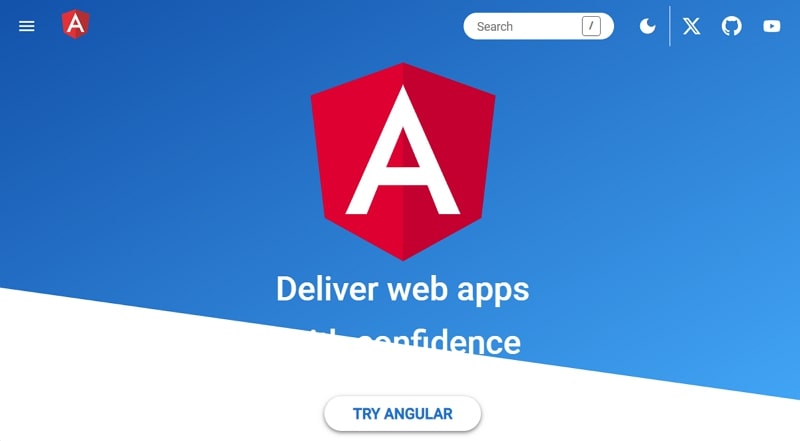
If you are looking for a high-performance framework, Angular is a leading platform with a user-friendly interface. This Next.js alternative focuses on highly interactive apps to deliver complex UIs efficiently. Angular has introduced an enhanced v17.3 version of its output API for safer and more consistent API outputs.
Key Features
- As a beginner, you might need sample tasks to increase productivity. For this, Angular offers you the example applications section to explore the fundamental concepts.
- To help you with various projects, Angular provides developer guides in its dashboard to empower your developing skills.
- With Angular tools like CLI builders and DevTools, you can access a wide range of methods to customize your modern website effortlessly.
2. VuePress
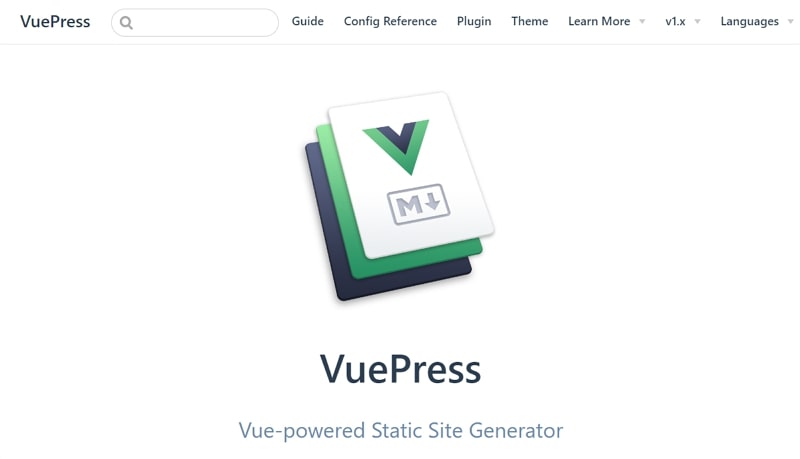
VuePress prioritizes simplicity to increase your project’s workflow without hassling into complex methods. It allows you to generate pre-rendered static HTML to present responsive pages. Moreover, you can customize your site without any configuration; just run the commands to create the directory inside your docs directory.
Key Features
- VuePress offers its own theme configuration to design your site’s layout and interactivity details, such as the navbar, sidebar homepage, etc.
- This framework allows you to apply headers automatically with its anchor link configuration option, for example, Markdown.
- Nowadays, most modern websites require emoji features, which is why VuePress provides a list of all emojis to link to your website.
3. Gridsome
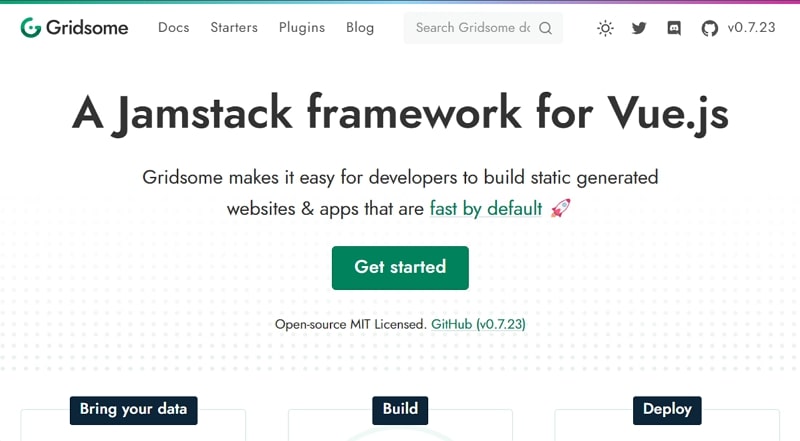
To build your web pages with ultra-performance, Gridsome offers you instant hot-reloading for any code change. This framework allows you to get asset optimization and progressive images that you can use with perfect page speed scores. Notably, this Next.js alternative can manage thousands to millions of hits without slowing your workflow.
Key Features
- With Gridsome, you can experience smooth local development that lets you see code changes in real-time without manually refreshing the page.
- Along with its extensive plugin ecosystem, you can benefit from Vue.js by easily finding plugins for various tasks.
- It also offers you file-based routing where any Vue files placed in the directory automatically become a static route to simplify east navigation.
4. Ember
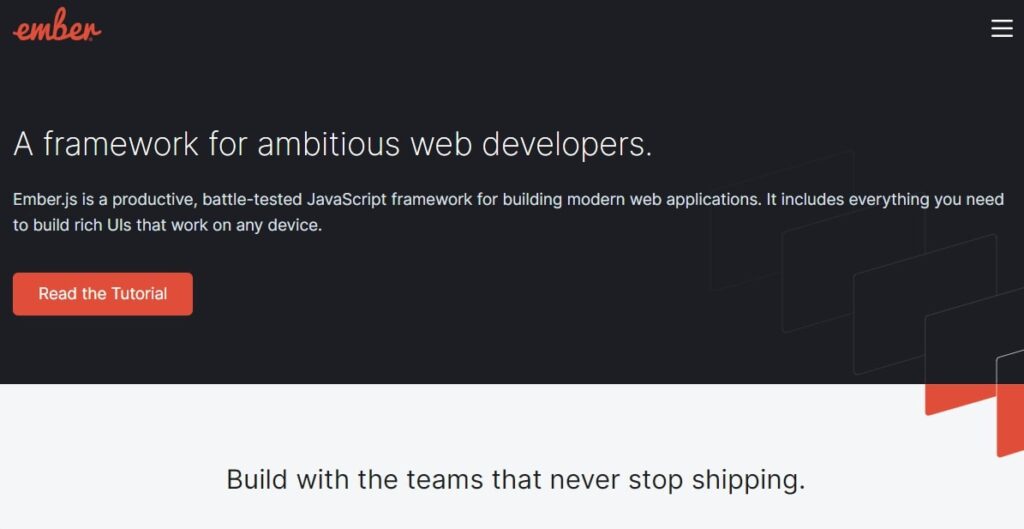
Ember is another Next.js alternative that helps build modern web applications with a battle-tested JavaScript framework. You can build a pipeline with Ember CLI that allows you to create new entities and organize files in the right place. Moreover, this platform has a built-in development environment to build your app with a single command.
Key Features
- Using Ember to develop web pages allows you to leverage a modern framework for component-based architecture.
- This framework provides an Object Relational Mapper (ORM) to simplify the interaction with API and manage data within your application.
- Additionally, you can streamline web development projects while reducing boilerplate code to easily maintain and understand Ember applications.
5. Razzle
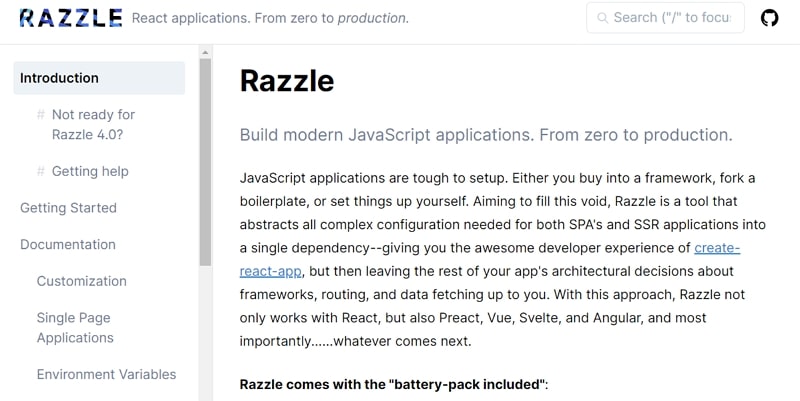
This framework is not only limited to working with React, but you can also use Preact, Vue, and Svetle to customize your web pages. Also, Razzle promotes transparency when developing projects so you can develop your applications without any complex configuration. Along with its community discussion, you can quickly get help from experts to maximize your productivity.
Key Features
- Razzle allows you to build the tailor process with Jest pre-configured using sensible defaults to test your React application.
- Remarkably, this web development framework provides the same CSS setup as create-react-app, which is likely familiar to many React developers.
- This Next.js alternative comes pre-configured to ensure your project utilizes the latest ES6 JavaScript features without additional setups.
6. Gatsby
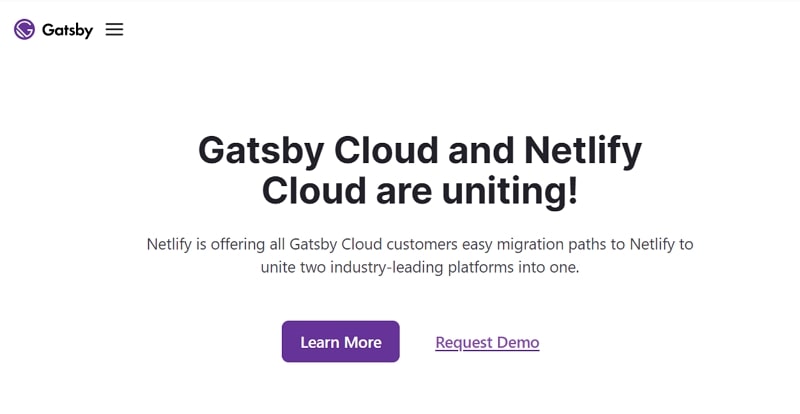
Gatsby allows you to add plugins with versatile functions and customization to increase your efficiency when developing websites. Here, you can use multiple styling approaches like Sass and CSS-in-JS library solutions to build web pages more smoothly. Moreover, using Gatsby as an alternative to Next.Js provides you with a complete learning guide to enhance your developing skills.
Key Features
- This framework allows you to use the Gatsby Cloud feature to review server-side analytics and accelerate troubleshooting when errors occur.
- You can also integrate E-commerce, Payment, and authorization with Gatsby Library to stay up-to-date with trendy projects.
- To embed media files on your web pages, this platform allows you to attach Imgix, Clouinary, and Vimeo extensions.
7. Keystone
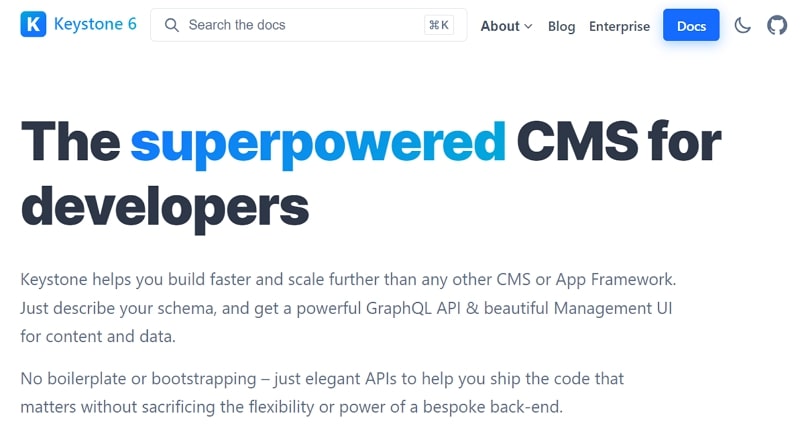
You can build your web development projects with Keystone much faster than Next.js. This Next.js alternative allows you to explain schema for high-quality GraphQL API and beautiful management UI for content and data. Furthermore, you don’t need boilerplate or bootstrapping because Keystone APIs help you develop the web pages without sacrificing the custom backend.
Key Features
- Keystone provides built-in access control mechanisms to demonstrate user permissions and ensure data security and user experience.
- Besides, this framework offers automated functionality for Creating, Reading, Updating, and Deleting (CRUD) operations on your data content.
- Along with its TypeScript Support, developers can improve code reliability and maintainability of typed supersets in JavaScript.
8. Quasar
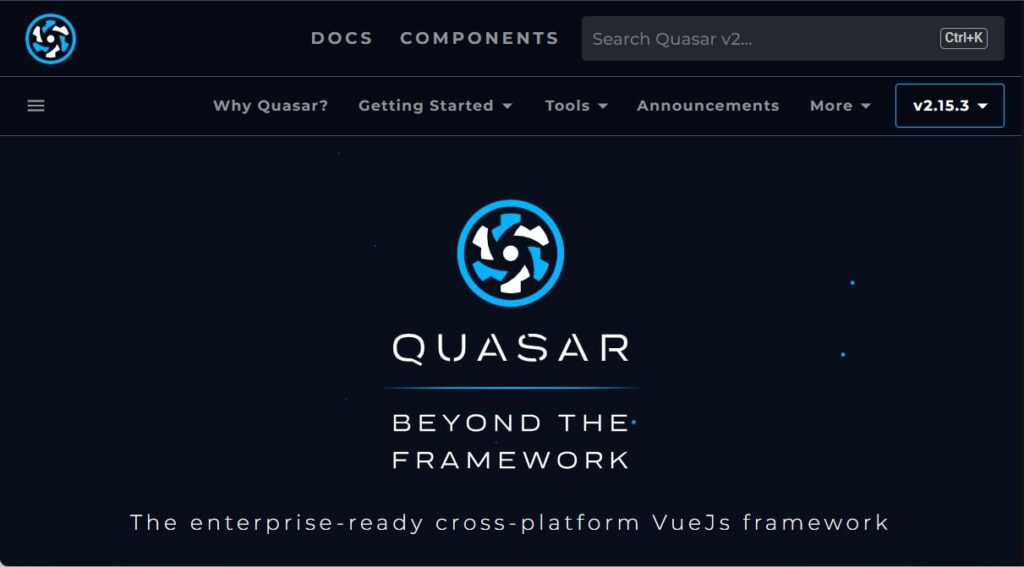
If you are a freelancer or working with an agency, Quasar will help you build innovative websites to satisfy your clients. This alternative to Next.js can handle the complete development experience with its efficient-focused framework. In addition, users can explore its top navigation bar to search functions and discover the most critical technical resources.
Key Features
- This Next.js alternative offers rich pre-built Material Design components with responsive and customizable options.
- To streamline the development process, its extensive tools and testing utilities ensure an error-free website.
- Also, it supports Vuex integration to simplify data handling and navigation of your application as a state management solution.
9. Svelte
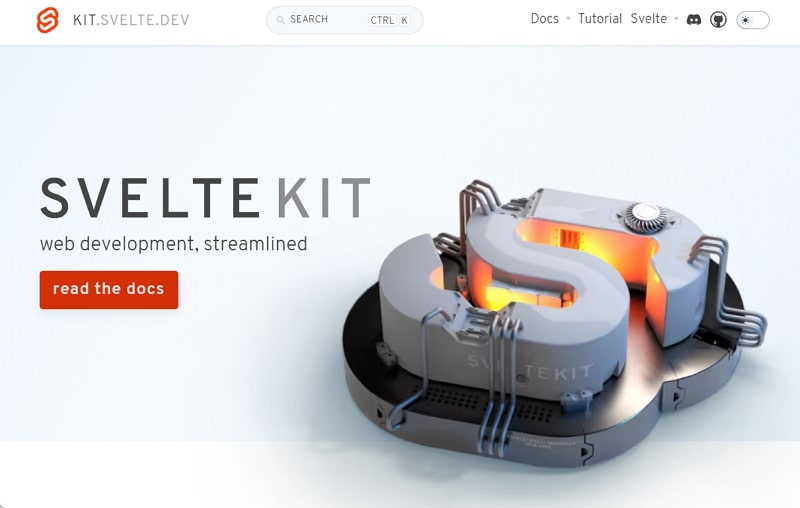
This web development framework can help you perform the easiest tasks to develop the interface components that users can interact with within their browsers, such as the comment section. Moreover, it has SvelteKit to render the components of the entire page with best practices and developments. You can utilize this platform effortlessly to add basic functionalities and advanced capabilities.
Key Features
- It allows you to build reusable UI elements and makes collaboration easier to help you develop complex projects.
- Using Svelte as an alternative to Next.js encourages developers to integrate well with accessibility libraries to build applications that everyone can use.
- You can also improve user experience with small bundle sizes compared to frameworks that rely on virtual DOM manipulations.
10. Hugo
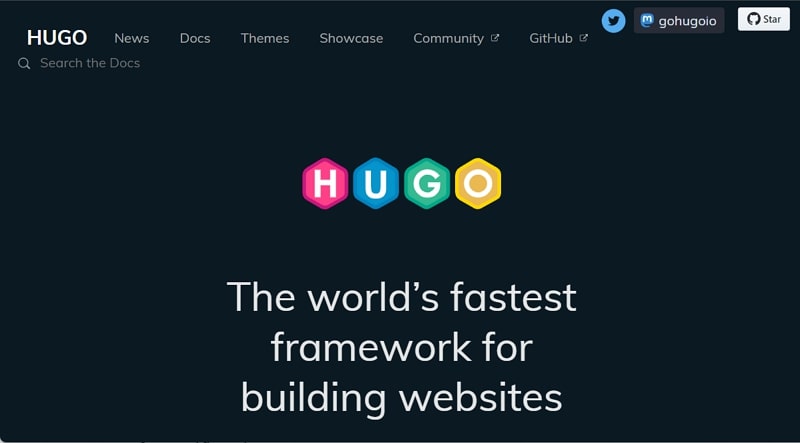
If you are looking for a powerful static website generator, Hugo is a good alternative to Next.js. You can build multilingual websites much faster and in a simple way that no other platform will offer you. Furthermore, this platform will increase your experience in creating websites with beautiful Markdown syntax and pre-built features like commenting.
Key Features
- You can use this alternative to generate static HTML websites, leading to blazing-fast load times and improving SEO performance.
- Hugo offers more flexibility through shortcodes embedded in Markdown, which extend functionality for specific tasks.
- Additionally, you are not limited to generating HTML, but you can also configure it to output your content in various formats, such as JSON or AMP.
Building Seamless Video and Audio Experiences in Next.js Using ZEGOCLOUD
When integrating new features into an existing website or app, ZEGOCLOUD remains the developers’ first choice. It offers extensive APIs and SDKs to embed in cross-platform sites or applications. With a few lines of code and limited coding knowledge, you can benefit from crystal-clear video and audio experiences in this Next.js optimizer.
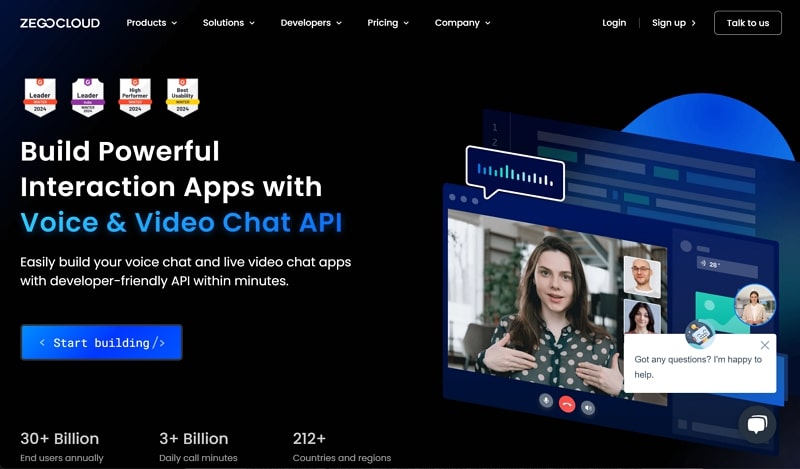
Surprisingly, ZEGOCLOUD has over 20 UIkits and 50 components to create engaging apps or sites from scratch. Moreover, it has high-quality video conferencing SDKs and APIs with group calls, screen sharing, face beautification, and recording features. You can also utilize its audio call API for clear voice conversations, including AI noise reduction and call quality monitoring features.
Key Features
- You can also use group calls, spatial audio, intelligent voice processing, and audio effects features in its audio call API and SDK.
- Additionally, you will get virtual background changer, co-hosting, call invitations, super resolutions, and multi-device support abilities in voice call APIs.
- Apart from voice and video APIs, there are live streaming, in-app chat, AI effects, and cloud recording SDKs and APIs.
Conclusion
Now that you have explored top-tier alternatives to Next.js and their key features to help you in web development. Besides, the limitations of Next.js and common reasons for looking for an alternative must help you discover a suitable solution. Above all, ZEGOCLOUD seems a reliable choice for developers to integrate an extensive range of APIs and SDKs into their websites or applications.
Read more:
Let’s Build APP Together
Start building with real-time video, voice & chat SDK for apps today!









